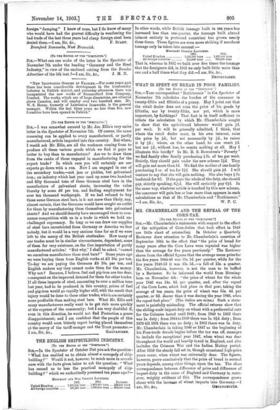MR. CHAMBERLAIN AND THE REPEAL OF THE CORN-TAX.
[TO THE EDITOR OP THE "SPECTATOR.") SIR,—Mr. Chamberlain's statements with respect to the effect of the mitigation of Corn-duties that took effect in 1848 are little short of astounding. In October a Quarterly Reviewer drew attention to Mr. Chamberlain's assertion of September 16th to the effect that " the price of bread for many years after the Corn Laws were repealed was higher than the average for five years previously." The Reviewer shows from the official figures that the average mean price for the five years 1844-48 was 55s. 5d. per quarter, while for the five years 1849-53 it was 43s. 5d.,—a fall of 12s. a quarter. Mr. Chamberlain, however, is not the man to be baffled by a Reviewer. So he informed the world from Birming- ham on November 4th : " the price of wheat for the whole year 1846 was 54s. 8d. per quarter, and, after the repeal of the Corn Laws, which took place in that year, taking the average of ten years, the price of wheat was 55s. 4d. per quarter, or 8d. dearer than it was during the year 1846, when the repeal took place." (The italics are mine.) Such a state- ment is painfully misleading. The official returns show that the sliding-scale import-duty on wheat with a preferential rate for the Colonies lasted until 1848; from 1849 to 1863 there was ls. duty ; from 1864 to 1869 there was ls. Old. duty ; from 1870 till 1901 there was no duty; in 1902 there was ls. duty. Mr. Chamberlain in taking 1846 or 1847 as the beginning of his Free-trade decade begins before the tax was off, manages to include the exceptional year 1847, when wheat was dear throughout the world and heavily taxed in England, and also includes the Crimean War and the Indian Mutiny period. After 1858 the steady fall set in, though occasional high-price years occur, when wheat was universally dear. The figures, however, prove conclusively that the price of bread in normal years depends, among other things, upon the tax. The close correspondence between difference of price and difference of import-duty in the cases of England and Germany is, more- over, weighty evidence of this. The correspondence grows closer with the increase of wheat imports into Germany.—I














































 Previous page
Previous page